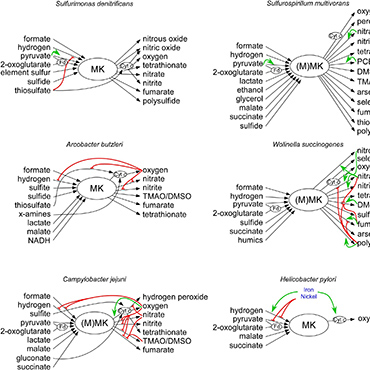
- by administrator
- 30 July 2019
Regulation of Respiratory Pathways in Campylobacterota: A Review.
van der Stel AX, Wösten MMSM.
Front Microbiol. 2019 Jul 30;10:1719.
The Campylobacterota, previously known as Epsilonproteobacteria, are a large group of Gram-negative mainly, spiral-shaped motile bacteria. Some members like the Sulfurospirillum spp. are free-living, while others such as Helicobacter spp. can only persist in strict association with a host organism as commensal or as pathogen. Species of this phylum colonize diverse habitats ranging from deep-sea thermal vents to the human stomach wall. Despite their divergent environments, they share common energy conservation mechanisms. The Campylobacterota have a large and remarkable repertoire of electron transport chain enzymes, given their small genomes. Although members of recognized families of transcriptional regulators are found in these genomes, sofar no orthologs known to be important for energy or redox metabolism such as ArcA, FNR or NarP are encoded in the genomes of the Campylobacterota. In this review, we discuss the strategies that members of Campylobacterota utilize to conserve energy and the corresponding regulatory mechanisms that regulate the branched electron transport chains in these bacteria.
